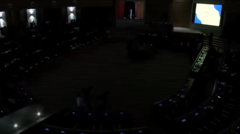A sudden power cut disrupted the Zimbabwean Parliament on Tuesday during Finance Minister Mthuli Ncube's delivery of the national budget speech, leaving high-ranking officials, including President Emmerson Mnangagwa and Vice-President Constantino Chiwenga, in darkness. This incident underscores the ongoing energy crisis afflicting the nation, marked by recurring 12-hour blackouts primarily attributed to drought conditions severely affecting power generation at the Kariba Dam, Zimbabwe's principal energy source.
Just before the blackout, Ncube warned that the agricultural sector was expected to contract by 15% this year due to drought, yet he projected a 6% growth in the economy for the following year, citing anticipated above-average rainfall that could bolster both agricultural output and electricity supply. Following the outage, opposition MPs vocalized their sentiments, suggesting that the power cut served as a poignant metaphor for the country's troubled state.
In response, George Manyaya, a spokesperson for Zimbabwe Electricity Supply Authority (Zesa), stated that the outage was unexpected and caused by a lightning strike, despite Parliament having a dedicated electricity supply usually protected from such blackouts. This event has further ignited discussions about the critical issues surrounding Zimbabwe's energy infrastructure and economic resilience in the face of environmental challenges.




















